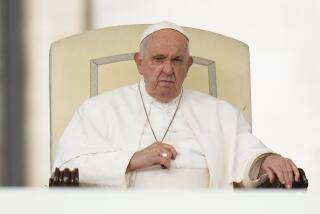Pope Lowers Expectations for Poland Trip
- Share via
VATICAN CITY — His first papal trip home to Poland in 1979 was a triumph that aroused an oppressed nation and helped to inspire the bold formation of the Solidarity movement that shook the Communist Bloc and drew the admiration of the world.
The second papal visit in 1983 was another triumph. It came in the darkness of martial law after the outlawed union movement had been crushed; but even though cowed by defeat, millions of Poles demonstrated and cheered his calls for solidarity, human dignity and workers’ rights. He sternly lectured the country’s Communist leader, Gen. Wojciech Jaruzelski, on the government’s failure to live up to promises of liberalization made before martial law was declared.
On Monday, Pope John Paul II returns for the third papal visit to his still deeply troubled homeland, but without the same triumphant expectations.
Although once again the pontiff will speak on themes of human rights, dignity and justice he will not be as confrontational against the authoritarian regime as he was in 1979 and 1983. Nor will he try to arouse hope among the estimated 10 million Poles who will see and hear him for the kinds of quick change that Solidarity once aspired to win, according to Vatican officials familiar with his already prepared speeches.
Accepting the Reality
“Today most Poles, including the Pope, accept the reality that under their system, change does not come quickly or easily,” one church official said. “So this visit will contain a more spiritual message, giving reasons for hope but not raising false hopes.”
The pontiff most recently acknowledged his own lowered expectations in a chance remark to reporters on his plane during a flight to Chile in March. Speaking of the government of Gen. Augusto Pinochet as “dictatorial but transitory,” he mentioned as a contrast Poland, where he said “there are no reasons to hope” for a voluntary transition to democratic government.
Today, the political realities of Poland have changed both for the people who have lost hope of shrugging off their authoritarian political leaders, and the government, which is presiding over a desperately declining economy with East Europe’s highest foreign debt--$35 billion.
There have been compromises on both sides since 1983: an acceptance of greater austerity by the people, and some liberalizing steps by the regime, including the release of most political prisoners and a relaxation of censorship.
Church as Mediator
The church, which officially disdains politics but is nevertheless a powerful political force in the 94% Catholic country, has taken on the role of mediator between government and people and is now negotiating with Jaruzelski for major concessions. First among them would be the legal recognition of the church by the Communist government, including recognition by the state of the diplomas and degrees granted by Catholic institutions, a giant step in an officially atheist society.
In exchange, the Holy See, at the urging of the Polish bishops, would grant diplomatic recognition to Poland, conferring a kind of international legitimacy on the hard-strapped Jaruzelski regime.
Although Vatican officials caution that this compromise will not be made final during the Pope’s visit, it appears to be so close that John Paul does not want to take any bold initiatives or speak out to his fellow Poles in such a way as to jeopardize it, they said.
But two of the Pope’s stops during his weeklong tour touching nine Polish cities will provoke powerful emotions among Poles. After largely pastoral pauses in Warsaw, Lublin, Tarnow, Krakow, Szczecin and Gdynia, John Paul will visit Gdansk, the birthplace of the Solidarity union, on June 12. While there he will meet with Solidarity leader Lech Walesa, whom he met secretly during his 1983 visit to Poland and once before at the Vatican.
At Priest’s Grave
Two days later, after stops in Czestochowa and Lodz, he will pray in Warsaw at the grave of Father Jerzy Popieluszko, the dissident priest who was murdered in 1984 by the regime’s security police.
In order to schedule the two controversial events, Walesa and the Popieluszko shrine, both the government and the church had to come to a compromise. The government reluctantly agreed to the two events only on condition that neither be listed in John Paul’s official schedule, which allows the regime officially to ignore them.
More to Read
Sign up for Essential California
The most important California stories and recommendations in your inbox every morning.
You may occasionally receive promotional content from the Los Angeles Times.













